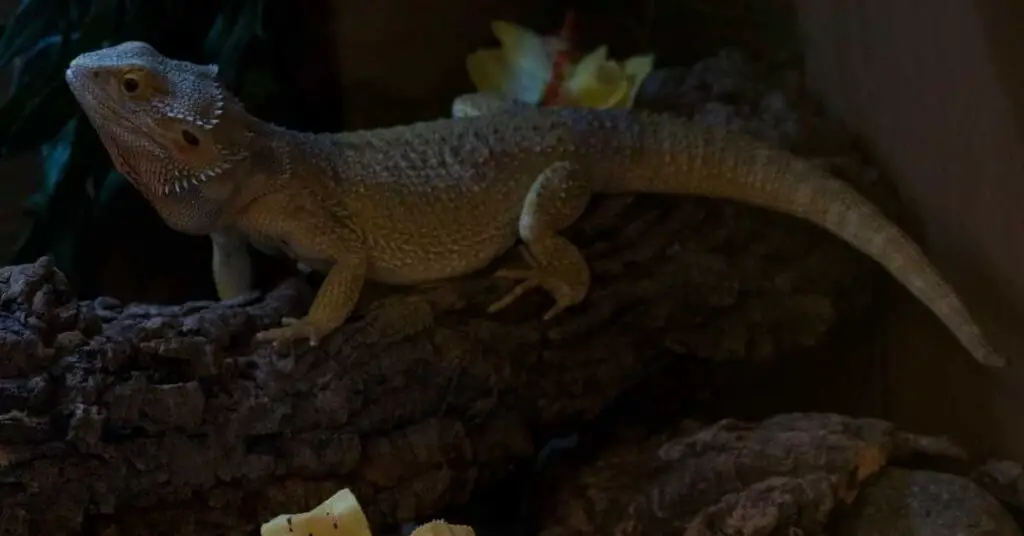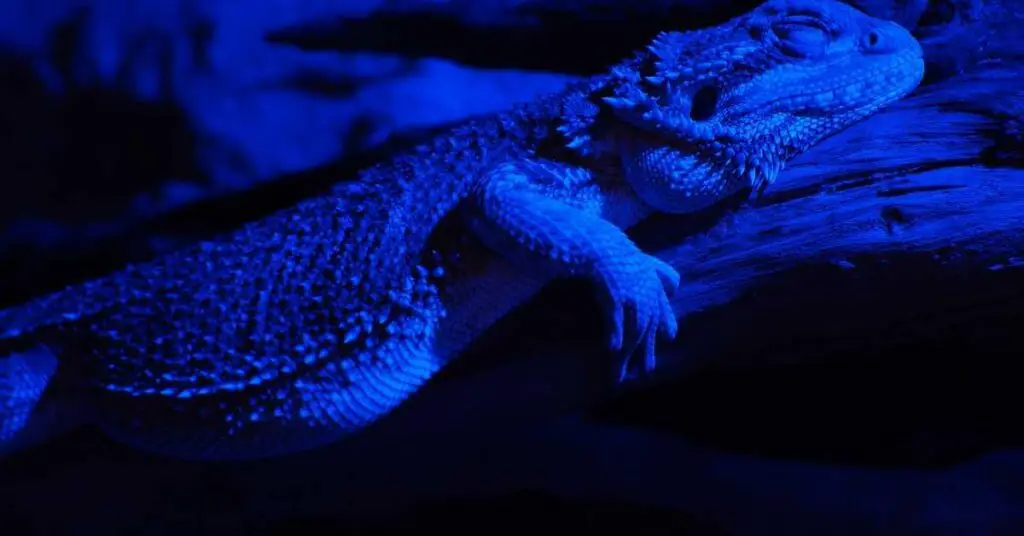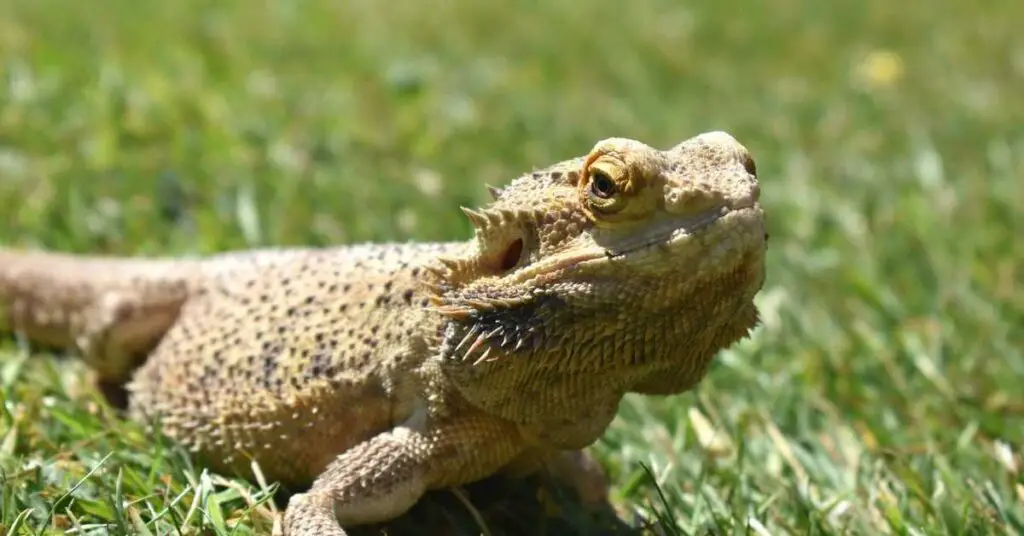We’re an affiliate. We may earn a commission on qualifying purchases through the links on this page. Learn more by reading our disclaimer.
Are Bearded Dragons nocturnal? No, Bearded Dragons are not nocturnal. Bearded Dragons are diurnal which means that they are awake and active during the daytime. They will hunt for food, bask under the sunlight or heat lamp, and lounge around.
Bearded Dragons are a type of lizard that spends their days alert, waiting for food to cross their path. They also enjoy basking in the sun, which is why it’s important to provide them with both direct sunlight and artificial UVB lighting. The best way to ensure your bearded dragon is healthy during the day is by providing them with all they need for a healthy life!
Are Bearded Dragons Nocturnal?
Even though many reptiles are nocturnal, bearded dragons are diurnal which means they are active during the daytime. They are usually active for about 12-14 hours every 24 hours depending on the time of year and will sleep for the better part of the night hours. They will search for water first thing in the morning after waking up. Pet bearded dragons follow roughly the same routine.
It is not uncommon for bearded dragon owners to see their dragon awake and active at night when the light is left on or there is a lot of loud noise keeping the beardie awake. This is often the reason that some people think bearded dragons are nocturnal when they are not.
It is due to human factors like leaving the lights too long when it is time for your dragon to sleep, and other factors like noise that throw your beardie’s schedule off. You should adjust lighting for bearded dragons in the terrarium based on the actual day or night timings by using a timer switch.

Are Bearded Dragons Active at Night?
No, Bearded Dragons are not usually active at night. They are diurnal which usually means that they are active during the daytime and sleep at night. However, there are some situations where Bearded Dragons can be active at night time if their lights haven’t been turned off and their sleep schedules are out of sync.
Bearded dragons will usually sleep at night. The ones in the wild will sneak into hidden caves or stay on higher ground to stay clear of night predators. The ones in captivity sleep in funny positions and could sleep as much as possible based on their light regulation. They have a third eye called the parietal eye used to detect predators and changes in light conditions, and it’s pretty much is an active part of the psyche and valuable any time of the day.
Are Bearded Dragons More Active at Night?
No, bearded dragons are not more active at night. If a bearded dragon becomes more active at night, it would mostly be due to human factors. If you have their lights on when they should be sleeping, it will cause disorientation and cause issues with their sleeping patterns. Ultimately, this will affect all aspects of your beardie’s life.
Why Is My Bearded Dragon Active at Night?
It could be that they are having health challenges due to stress and discomfort caused by distortions in their sleep patterns. It can lead to illnesses and, ultimately, death if the issues aren’t addressed. Prolonged movements and noise from the surroundings are all disruptions that can make a bearded dragon active at night.
Can I Hold My Bearded Dragon at Night?
Yes, you can hold your bearded dragon at night; as long as it’s a comfortable position, they’ll drift to sleep. It’s a way to bond with a new bearded dragon too. Holding them at night builds their confidence in you; they will usually relax. Some bearded dragons stayed calm when wrapped in a blanket like a burrito and held or put on the chest. When they’ve gotten used to you, they’ll continue sleeping when you’re transferring them to their terrarium.

Can I Sleep with My Bearded Dragon at Night?
It is not safe for you to let your Bearded Dragon sleep with you at night. It would be real easy for you to roll over on your beardie at night possibly hurting, or worst case, killing your dragon. In comparison to a human, Bearded Dragons are tiny creatures, and their size will be a significant risk for a reckless sleeper at night.
You should also consider what other things your dragon could get into during the night if they’re able to get down from the bed. Do you have other pets? Could they hurt your dragon during that time or is there something else that could hurt your dragon? As Bearded Dragon keepers, we have to be diligent and responsible to think about these things to ensure our safety and the safety of our dragons.
Is It Bad to Wake up Your Bearded Dragon at Night?
It is not a good idea to wake up a sleeping bearded dragon at night. They need their sleep just as we need our sleep in order to be happy, healthy, and to be able to function the next day. This is why it is important that we do not disturb a sleeping bearded dragon, knowing that they have been awake pretty much all throughout the day and need to rest for the following day. Some beardies have been known even to bite their owner when awakening from their sleep at night.
If for some reason you have to wake up your Bearded Dragon at night, it is best to develop a routine or process that you follow every time when you handle your dragon. For example, I like to gently rub my dragon’s back every time before picking them up. This lets the beardie know that it is me and that the fact that I do it every time, helps them know what to expect. They know that when I rub their back that I am going to be picking them up.
What Time Do Bearded Dragons Go to Sleep?
It is essential to understand the time and when bearded dragons sleep because a healthy sleeping pattern will positively affect their daily behavior and energy. They need about 8 to 14 hours of sleep daily. While many bearded dragons can sense changes in sunset and sunlight, many dragons in captivity are at the mercy of their owners to ensure that nighttime conditions are well regulated for them to sleep.
A light switch is a popular way of conditioning bearded dragons’ sleeping and waking times, and 9 pm is a good sleeping time. It is important to get your bearded dragon onto a schedule at an early age by turning off the light at a certain time and then turning it back on in the morning. Getting enough sleep is important not only for you but also for the health of your bearded dragon.
Do Bearded Dragons Need Complete Darkness to Sleep?
Yes, Bearded Dragons need darkness in order to sleep. This includes any tank lights that you have for your dragon, any lighting that is in the same room as your bearded dragon, and any lights that can be seen from your dragon’s tank. These lights can affect your Breaded Dragon’s sleep and cause them to not be able to sleep when it is time to.
If you cannot completely block out lights and other distracting things from your Bearded Dragon’s tank, then you could use a trick that many bird owners use and simply cover their tank with a sheet or other large cloth. Just make sure that the cloth breathes or you can leave it uncovered on one side to accommodate fresh air getting into the dragon’s enclosure.

Should I turn off my bearded dragon’s light at night?
Yes, you should turn off your Bearded Dragon’s lights at night as they are diurnal and sleep during the nighttime. Your dragon will need darkness to be able to actually fall asleep and not be distracted with everything that is going on in the room, house, or even what is happening on the television. They are alert and curious creatures that are aware of their surroundings so the littlest thing can keep them from going to sleep.
If for some reason you cannot turn your Bearded Dragon’s light off for the night or you forget to, it is ok as long as it doesn’t become a regular thing. Your Beardie needs to have some order to their schedule and confusing your dragon with the light on all day and all night can be detrimental to the health of your dragon in the long run.
Should I Turn Off My Bearded Dragon’s Heat Lamp at Night?
You should turn off your Bearded Dragon’s heat lamp if it is one that emits heat and light as well. Beardie’s need darkness to sleep and if your heat lamp is also a light then it should be turned off so your dragon can go to sleep. There are other options for heating your Bearded Dragon’s tank at night to keep them warm.
Even though Bearded Dragons in the wild are used to cooler nighttime temperatures that don’t mean that your beardie is used to having cold temperatures at night. If your dragon’s tank is in a room that isn’t heated or has AC vents blowing then you should definitely provide your dragon with some form of overnight heat either in the form of a red heat bulb or an under-tank heater. Bearded Dragons do not see the red color so you can have a heat lamp that only emits red light when on.
Why Would a Bearded Dragon Sleep During the Day?
Bearded Dragons are one of the most active lizards both in the wild and when kept as pets. During the day it is not uncommon to see a dragon roaming around their tank, basking underneath a heat lamp one moment and then up and alert when someone enters the room. One of the most common misconceptions is that Bearded Dragons are “lazy” and just lay around all day. This is not true.
Because of this a lot of dragon keepers will often let this behavior go which makes one of the most common issues that keepers experience is their dragon sleeping during the day. This isn’t normal unless during brumation.
If you experience your dragon sleeping a lot or even just basking all day with very little energy, you can attribute this to a few different reasons. This isn’t a natural daytime behavior for Bearded Dragons and should indicate a problem with their health and/or husbandry.
Here are a few of the most common reasons for a lethardic Bearded Dragon:
Temperature
Bearded Dragons need constant temperatures during the daytime between 75-85 degrees F (24-29 degrees C) in their enclosure. Their enclosure should have a basking spot where the beardie can get close to their heat lamp in order to warm up their body temperature. This basking spot should be a consistent temperature between 88-100 degrees F (31-38 degrees C).
The Bearded Dragon enclosure should feature two distinct temperature zones, one cool and one warm/hot. You can accomplish this by putting the heat lamp on one end of the enclosure. This helps the beardie to thermoregulate their body temperature by moving from one zone to the other when needed. These temperatures should be closely monitored with digital thermometers to ensure that the Bearded Dragon always has the option to choose.
If the temperature inside the tank is too cold, your dragon will be lethargic.
Lighting
Bearded Dragons need full-spectrum lighting that features both UVA and UVB for their enclosure. It is important that your dragon has both types of light available. Bearded Dragons need UVB light to help process Vitamin D which helps them absorb and process calcium. The UVB bulb should be on during the day and placed where the dragon will get the most exposure to it.
Diet
Another common issue with Bearded Dragons being lethargic or lazy during the day when they should be up and active is being fed an improper diet. This can be something as simple as the wrong ratio of protein to vegetation, the wrong types of insects, the wrong vegetables, and more. First, the ratio of what your dragon should eat is based on the age of the dragon.
See the table below for the proper ratios:
| Age/Size | Protein | Vegetables/Fruit |
|---|---|---|
| Baby (3-6″) | 80% | 20% |
| Juvenile (7-12″) | 60% | 40% |
| Adult (12″ and larger) | 40% | 60% |
Baby Bearded Dragons should be fed primarily gut-loaded feeder insects such as Dubia roaches, crickets, or mealworms as their body needs protein to grow. These feeder insects should be dusted with calcium powder and should make up 80 percent of their diet. In addition to the insects, your baby bearded dragon should also be offered fresh vegetables daily so that they can develop an appetite for them. The older your Bearded Dragon gets the more the diet should change.
You can also supplement their insects and salad with some Bearded Dragon food that is available on Amazon, your local pet stores, and even some supermarkets. This additional food can serve as a supplement to your dragon’s diet, as well as a great thing to keep on hand if you run out of live insects until you get some more in.
Frequently Asked Questions (FAQs)
Here are some of the most asked questions:
What Happens if You Forget to Turn Your Bearded Dragons Light On?
Forgetting to turn on your Bearded Dragon’s light in the morning will cause your dragon to sleep longer unless there is a source of natural sunlight that comes into the room where your dragon’s enclosure is. This could be sunlight coming through a window that would let your dragon know that it was daytime. Your dragon will not benefit from the sunlight coming through the window other than just knowing that it was daytime because most windows block out the beneficial UVB rays that your dragon needs.
What Time Do Bearded Dragons Go to Sleep?
Bearded Dragons do not have a set bedtime but rather they should get a set amount of time to be awake and a set time of sleeping time. This fluctuates in the wild some depending on the season so there isn’t a perfect answer to how many hours of each your dragon needs. Typically Bearded Dragons sleep between 8-12 hours a day at night. During this time we should provide them with the darkness they need to get good sleep.
In Conclusion
If you’re thinking of getting a bearded dragon, congratulations! These lizards make great pets and are perfect for those who want an active pet. Bearded dragons are diurnal, which means they are awake during the day.
They need plenty of space to run around and play, so be sure to give them a large tank or enclosure. In addition to a spacious home, bearded dragons also require proper nutrition and care. With the right supplies and some basic knowledge, owning a bearded dragon can be easy and fun.

